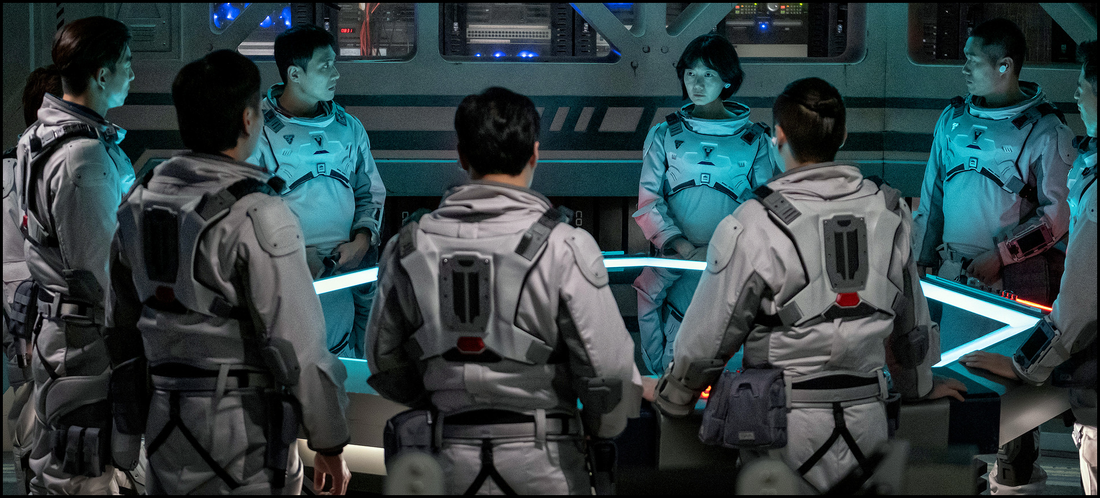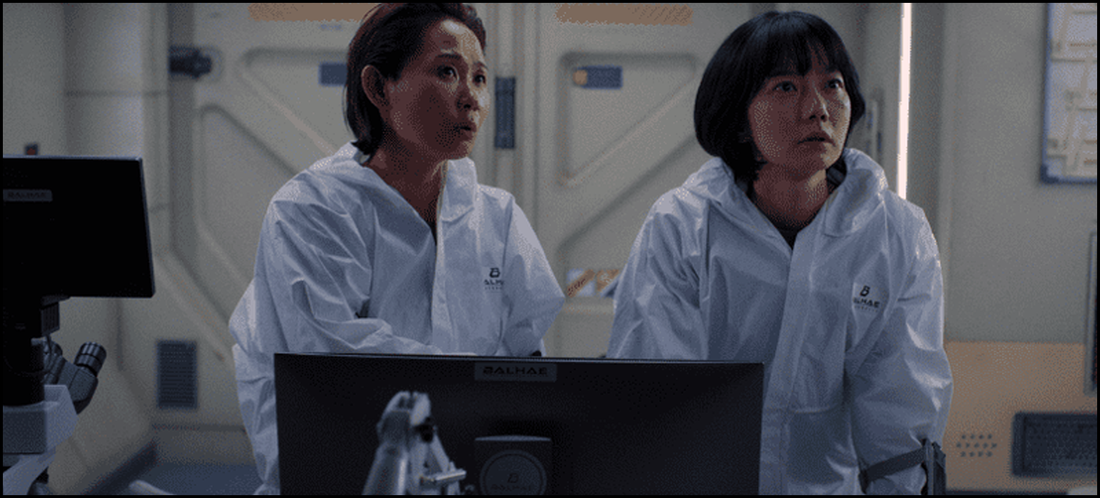Into this volatile mix heads a crew of various space specialists all under the command of Captain Han Yoon-jae (played by Gong Yoo) and Doctor Song Ji-an (Bae Doona). While Han’s tasked with keeping the astronauts in line on such a dangerous mission, Song’s responsibility is to recover samples of lunar water and get them back home. At this point in our history, Earth has succumbed to the ravages of climate change; as our oceans have dried up, water is in increasingly short supply, and whatever nation can replenish our planet will clearly be at the forefront of rebuilding our civilization. As fate would have it, there’s a dark, dark secret behind the lunar water that might spell our collective doom instead of being the salvation we need.
Like so many good streaming thrillers, it’s difficult to discuss much about Sea without spoiling a few of its mysteries. Essentially, the program is constructed in the classic ‘race against time’ format – the crew winds up marooned on our only satellite when a malfunction sends them crashing to the lunar surface – and the race for survival starts in the series’ opening moments. The tension never quite lets up – it’s all delivered at near breakneck pace – as each developing chapter (there are eight episodes) brings something new to the tale, be it the exposure of a new government conspiracy, the reveal of a secret double agent, or even the end result of science run amok on a moonbase that’s out of control in more ways one screenwriter can imagine. Alas, after eight episodes, I’m not sure every question raised was suitably answered (who originally tasked these traitors in our midst gets short shrift), but I’ve been unable to uncover whether or not this one will be continuing into a second season at this point. (Netflix occasionally plays its cards close to its chest.)
While the cast is quite good, the show clearly benefits from excellent set design: Halbae Station – entirely fictional – looks and feels like an authentic, expansive installation built both above and below the lunar surface. Its labyrinthian corridors and crawlspaces seem to stretch on forever, making it a rather delicious location to physically and psychologically hide both the show’s proposed state secrets and its rising body count. Sea is a land-based Star Trek if crafted by Agatha Christie – these explorers sent out into the unforgiving Final Frontier find themselves at odds with not only Mother Nature (in Space!) but also each other as secret allegiances threaten to tear the crew apart. Giving the sets and costumes an air of realism only further ratchets up the pressure of an increasingly volatile situation.
Mankind’s dire predicament – the fact that Earth appears to have lived through its best days – was front-and-center in Christopher Nolan’s Interstellar (2014), an award-winning endeavor that also saw a government commissioning a space crew to save our world from extinction. James Cameron’s signature Aliens (1986) made excellent use of dispatching a crew into what was suspected to be treacherous circumstances, and Sea certainly taps into that same sense of operational claustrophobia in its eight episodes. 2018’s Nightflyers (on Syfy) – an adaptation of the George RR Martin work – saw a team of astronauts slowly descending into the madness on their mission to the stars, and their sense of isolation and abandonment increased as the bodies began to pile up. Sea might even draw some comparisons to ABC TV’s popular serial Lost wherein flashbacks were required to ‘fill in the gaps’ for characters whose identities were never as easy as presented; indeed, Netflix’s audiences learned more about Han, Song, and several other prominent players as their drama unfolded in similar moments being filled in parenthetically.
What this means to me is that, in many respects, Sea finds itself in good company mechanically … but the story could’ve used a bit of attention with respect to tightening the screws on its infrastructure. The story spread across eight episodes felt a bit long in the tooth, as it were, and this one probably could’ve delivered stronger moments were it pared down an hour or two. In fact, the series’ last two hours felt a bit repetitive given all that the team had been through, slowing down the action with what I suspect might be the program’s most predictable moments. (Secret identity reveals and character sacrifices always run the risk of being a bit maudlin no matter how well they’re handled or how efficiently they’re delivered.) Loping off a plot twist here or there might’ve brought this one to closure with more panache, and it still could’ve had the hook for a second season that’s given here. (Yes, there is one, but as I said I’ve no idea if this one’ll get picked up.)
But as binges go, The Silent Sea makes the most of the material provided. Don’t look for all of the science to be fact-based, leave a bit of room for a modicum of hokum, and be prepared to forgive some of the forced feel-goods of its flawed finale. It’s the wild ride on this raging Sea that matters most, and I thought this one worth a single sailing.
-- EZ



 RSS Feed
RSS Feed